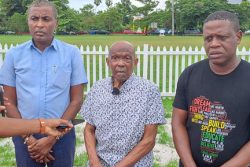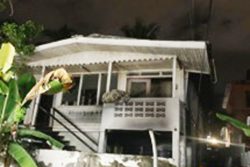Despite the fact that in May nearly all territories had asked the Caribbean Examinations Council to rethink their proposals for this year’s CSEC and CAPE exams, their concerns were not taken on board. CXC should not be surprised, therefore, at the incredulous response from any number of regional Ministries of Education about what has been described as the flawed grades for these that the Council has now awarded. Our own Minister of Education Priya Manickchand commented, “This is a countrywide rejection of what appears to be too many discrepancies. We’ve seen children who otherwise performed very well throughout their academic life coming in with Grade V and Grade VI … We’ve seen entire schools going ungraded although everybody sat the examination, so clearly something happened.”
The Guyana Teachers’ Union was in complete accord. Its General Secretary Coretta McDonald who sits as an opposition MP reminded CXC that not just her union but the Caribbean Union of Teachers (CUT) had objected to the modified exam but had been ignored. “We had meetings with them [CXC] in March and May. CUT voiced our concerns. We spoke about CXC owing our parents who paid for two parts of the exam but got one. We voiced our concerns about the credibility of the exams and what kind of weighting the 2020 exams would have against the 2018 or 2019. We were given all the political talk from CXC and here we are with our children being disenfranchised with willy-nilly grades,” she said.
The new examination arrangements were introduced to take account of the coronavirus pandemic, and were viewed by CXC as being preferable to either postponing or cancelling the exams altogether. Under normal circumstances most of the tests have two components: Paper I which involves multiple choice answers, and Paper II which is essay based. In addition to that a proportion of the marks are accounted for by School-based Assessments or Internal Assessments. Under the rules applying this year candidates sat one common paper (Multiple Choice), the results from which along with moderated SBAs provided the final grades.
There were a few exceptions to this involving candidates sitting Modern Languages, Human and Social Biology and Visual Arts, who had to complete additional components.
While everyone knows the weightings for the different elements in a normal exam situation – and they are not quite the same for every subject − CXC simply did not disclose how these applied in relation to the special provisions for this year, and whether they were the same across the board. It was a singular error which not only opened them to charges of a lack of transparency, but also potentially to a lack of fairness. And where public exams are concerned the perception of fairness is everything if their credibility is to be maintained.
Mathematically-related subjects will arguably be less affected than literary-based ones such as History or English Literature by an emphasis on multiple choice. Under normal circumstances where the latter subjects are concerned as opposed to the former, Paper II carries the most weight when final grades are being computed. Whatever the subject, however, once that paper is eliminated, all students and teachers are entitled to know how the weightings will be allocated.
The normal practice in History, to take one example, is for the examiners to maintain a bank of questions for multiple choice which are then recycled. Internal Coordinator for Examinations at Queen’s College Samantha Liverpool was reported as saying that this year about 80% of questions had been recycled. No one is allowed to take copies of multiple choice papers out of the examination room, but over the years some teachers have become adept at building up a reservoir of these for the literary-based subjects in particular. In the past it has been reported that each student in the exam room will have to memorise one question, and so over the years a school can build up a stock and will drill the candidates in the answers. In the absence of a Paper II, therefore, to what extent will Paper I reflect the knowledge and understanding of an examinee?
It would seem that the reason for CXC so drastically pruning the exams had nothing to do with the safety of candidates, and everything to do with the safety of markers and the difficulties of assembling them together for the purpose of marking the scripts, as has been the norm. Multiple choice questions could be marked online; essay-type answers required a physical presence. One might have thought that a bit of imagination might have thrown up some possible solutions to this problem, but imagination of any kind appeared to be lacking at CXC HQ.
So now the Council finds itself deservedly facing a backlash from across the region for its aberrant results. Our report on Friday provided a number of examples. With reference to QC Ms Liverpool was quoted as saying, “So when I look at a student who would have gained over 95% in an SBA, looking at a paper where over 80% of the questions came back, please don’t tell me a Queen’s College student failed that exam. Our students at the College are accustomed to very challenging examinations and they all can attest to that.”
The CXC exams both at the CSEC and the CAPE level are a source of great anxiety to students because they are perceived as the passkey to the future, particularly for those who have a tertiary education in mind. For poorer students there is in addition the amount of money their parents have had to scrape or borrow in order that they could sit the exams. The Council should not be cavalier, therefore, about the depth of feeling their miscalculation has generated.
Yet in its response to the regional outcry CXC was typically impercipient. Anyone with questions about an absent or ungraded result can submit a query, it said, while those with questions about their grade who would like to have a script re-examined could submit a request for a review. However, the cost for a review, they added, was US$30,000. Minister Manickchand used the word ‘flippant’ in relation to this response, and indeed it is. When so many people in all the territories have ‘queries’, then there is something more at stake than a question about the results of a few odd cases. It is not a review which is required, but something more fundamental like an inquiry or at least an investigation.
CXC might do well to cast its eyes across the pond to where both the Scottish and English education authorities also made changes to national exams this year and published results which were regarded as unacceptable. After demonstrations in various parts of the country, Scotland backed down very quickly, while England took rather longer, with the Minister of Education only surviving in his post by the skin of his teeth.
In the Caribbean’s case it won’t be any ministers paying a political price; they, the unions, parents and teachers across the territories are as one, and together they constitute a formidable force. What is at risk is CXC’s reputation as a reliable, fair examinations body, and in a worst case scenario, its viability as an institution. And that would be a tragedy for the anglophone Caribbean.
It should note that the early warning signs are there. The QC administration has indicated a preparedness to approach the courts for an injunction blocking an official declaration of results until such time as its concerns are satisfactorily addressed. It must occur to the Council that this is a tactic which might be replicated across the region, and if that happens, what do they do?
Even more serious is the indication from QC Principal Jackie Benn-Ralph, who has the support of the PTA and the Old Students’ Association that the school intends if necessary to pursue re-introducing a second examining body into the public school system. “If CXC does not bend we will petition … through the Ministry of Education to remove Guyana from writing the CXC examinations. There are other examinations bodies… ” she said. It is a warning the Council should not take lightly.
What CXC should do now is admit that it has made a mistake. In the interest of transparency it should make public how it arrived at its grades, and give the assurance that it is prepared to revise these, possibly by placing greater emphasis on SBAs/IAs, which one presumes was not done for the purposes of the initial awards, given the level of anger in the schools. It has to be said that the virtual press conference hosted on Friday by CXC Registrar, Dr Wayne Wesley did not provide any edification on the major questions raised by stakeholders.
While the mistakes in Scotland and England were of a different order, it was a retreat to school assessments which produced acceptance from students and teachers there. If CXC does not act soon, it will at the least be inviting a formal regional investigation which will not give it any quarter.









